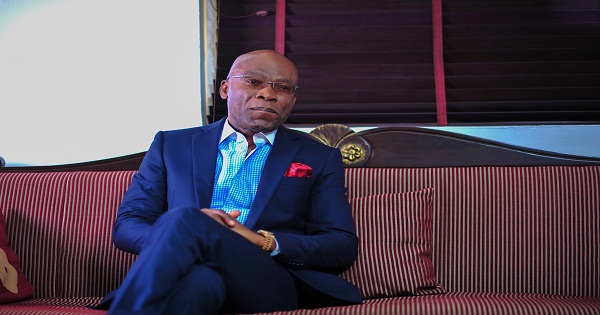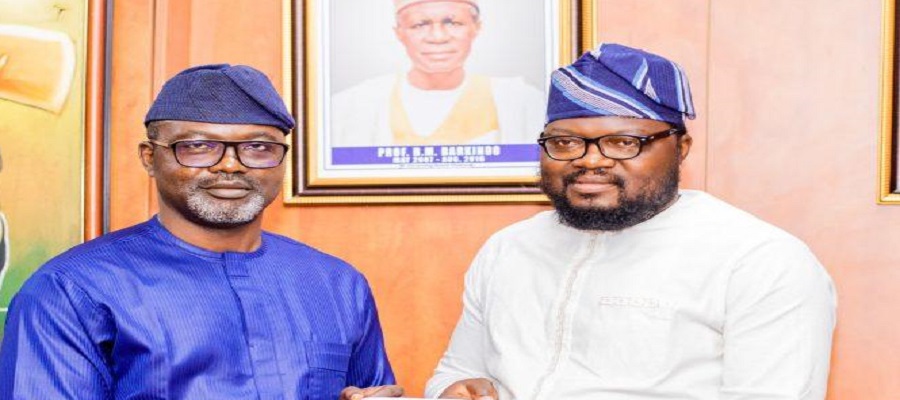News
Anambra can alter Nigeria’s destiny – Ekeh, Zinox boss

Chairman, Zinox Group, Leo Stan Ekeh has described Anambra as a state with global capacity to influence and positively alter Nigeria’s destiny.
Ekeh affirmed that the state has all it takes to make this a reality. Further, he noted that the wealth, energy and knowledge per square meter in Anambra does not exist in any other part of Africa.
Nevertheless, the Zinox boss urged the state government to open its eyes to the immense opportunities lying within the state with which it can re-configure the narrative for good.
Ekeh made this call at the 2019 Anambra Business and Investment Roundtable on Monday, November 25th, 2019. He spoke on the topic: Doing Business in the 21st Century.
The summit, with the theme – Beyond Infrastructure: Rethinking the Future – was held at the Anambra Governor’s Lodge, Amawbia, Awka.
In attendance at the event was the Anambra State Governor, Willie Obiano; the Deputy Governor, Nkem Okeke; Speaker of the Anambra State House of Assembly, Uche Okafor; the Obi of Onitsha, Nnayelugo Alfred Nnaemeka Achebe; former Governor of the Central Bank of Nigeria (CBN), Prof. Chukwuma Soludo and other members of the Anambra state political set-up. Also in attendance were corporate egg-heads and entrepreneurs drawn from various spheres of the economy.
‘I am an Igbo man from Imo State but here I am in Anambra and delighted to be here as well. Why? Anambra state has the global capacity to alter Nigeria’s destiny. You have it all in Anambra State but you have to certify it in the 21st century for it to be rewarding. You have credible human capital, brilliant minds and the right investment climate to make it happen,’ Ekeh noted.
Nevertheless, Ekeh who was the keynote speaker at the event, sounded a note of caution.
The serial digital entrepreneur warned that the state must wake up to the fast-evolving dynamics of the technology-mediated 21st Century.
Urging the Anambra State governor, Willie Obiano to invest in education and upgrade human capital in the state, Ekeh disclosed that this is the surest route to helping Anambra achieve its considerable potential.
‘I must commend the governor for what he is doing in the state. However, the 21st Century requires us to anticipate the future. If you look at the current Zinox Future Visions emblem of a man in deep thought, you will see it speaks to our mindset as a corporate with an eye on the future. This has been my story throughout the over 30 years I have spent in business.
‘You must invest in the next generation, especially the children of the poor because these are the ones with a mindset of disruption.
‘There is analogue knowledge and there is digital knowledge. Our generation relied on 80 per cent common sense and 20 per cent knowledge. But our children have global exposure and the benefit of better education, so they mainly use 80 per cent knowledge and 20 per cent common sense.’
Continuing, Ekeh noted that: ‘The Anambra state government must launch a Knowledge or Digital city in Awka with smart facilities and certified knowledge workers to re-train teachers across platforms and equip them to prepare our children for the digital age.
“In addition, the government should consider setting up and attaching a finishing school to the knowledge capital so that candidates are prepared as global citizens.
‘There is a fundamental problem with the quality of graduates we are currently churning out. Many of them are not fit for the 21st Century work-place. You must invest in these kids to make them relevant in the global marketplace and the multiplier effect will transform the fortunes of Anambra state for good.
‘You must build and equip many young graduates with skills in emerging technologies such as Artificial Intelligence, Robotics, Machine Learning, Cloud Computing and Big Data, among others.
‘I embarked on a similar intervention in Imo State after encountering the child of a widow who aced WAEC with straight A’s but regularly fell short in JAMB. It turned out that many of these students had never seen a computer in their lives but had to use a computer in sitting for the JAMB examinations. So, I spoke with the Commissioner of Technology in Imo State and set up a digital training centre where over 5,400 students are currently being exposed to computer appreciation and other digital skills. I am also paying these students to attend the classes. A week to the exam, there will also be a refresher session to ensure they are brought up to speed ahead of the examination.’
According to Ekeh, the second quarter of the 21st Century will delete many of the known names in business if they fail to rise up to the evolving era of change.
‘Our children will achieve within a few years what many of us struggled to build in 30 years. That is the age we are in. It is an era of miracle wealth. An age in which you do not need a Godfather to succeed. An E-commerce business like Konga, for instance, which is managed by my son and his colleagues has over 187,000 merchants trading on its platform. It can reach customers nationwide and deliver to them without stress. Even on Sundays when some of you are in church, business is on-going on the platform,’ he enthused.
Urging the Anambra state government to rally well-meaning sons and daughters of the state as well as the private sector to partner with it in its mission to transform the state, Ekeh counselled that this move is paramount in view of its long-reaching implications for the state.
‘The state government will never have enough money to handle everything alone. Therefore, you must reach out to Anambra indigenes and other investors to come to the aid of the state. If you invest N5bn in a digital centre, the returns will be massive.
‘But you must set a system to ensure it is properly managed. That way, investors such as myself will be encouraged to come in and invest and then reap some profit from their investment. However, politicians must not be allowed to hijack the system. Every beneficiary nominated must be screened and passed through the process to ensure they are selected on merit,’ he counselled.
Furthermore, Ekeh advised Anambra parents to leverage on their assets and empower their children. He disclosed that it is a reasonable risk to invest in one’s children while stating that human beings have been classified into three in this century – employers, employees and fools.
‘Don’t allow you kids to be rated as fools while you have billions siting in different asset classes,’ Ekeh warned.
Also speaking at the event, Gov. Obiano expressed delight and confidence that the summit will yield immense benefits for the state.
‘…The insights from today’s deliberations will set us firmly on the path to building a more socially prosperous state not only from the riches that lie beneath the soil, but essentially from the infinite possibilities that lie between our ears.’
The well-attended event featured panel sessions on Education and Health, ICT and the Creative Industry, Tourism and Hospitality as well as Housing and Infrastructure.
News
LG Launches “Radio Optimism” Campaign to Spread “Life’s Good” Through Music

LG Electronics has launched a new brand campaign, “Radio Optimism,” designed to help strengthen meaningful human connections and spread optimism through shared musical experiences.

This initiative aligns with LG’s brand promise, “Life’s Good,” and addresses the growing challenge of forming genuine relationships in a technology-driven world.
The Radio Optimism campaign seeks to counteract the disconnection often felt in an era dominated by superficial interactions, such as likes and comments on social media. By harnessing the power of music, LG aims to foster deeper bonds among individuals, promoting a more fulfilling life.
“As technology advances, meaningful human connections become increasingly vital to enrich our lives. LG continues its commitment to bringing optimism into customers’ daily lives, staying true to our enduring brand promise of ‘Life’s Good,’” said Kim Hyo-eun, head of LG’s Brand Management Division.
This campaign reinforces LG’s commitment to creating enriching experiences in digital spaces where today’s consumers spend significant time. Building on this mission, LG has continuously engaged with younger audiences through participatory campaigns that bring the Life’s Good philosophy to life.
Last year’s “Optimism your feed” campaign leveraged social algorithms to foster positivity on social media. This new initiative specifically seeks to address the paradoxical disconnection in an era of hyper-connectivity.
“One of the most reliable predictors of happiness is having deep and meaningful relationships,” said Jean M. Twenge, Professor of Psychology at San Diego State University. “Yet today, many people are spending more time online and less time connecting in person. Social media in particular tends to create shallow relationships rather than the deep connections people need.
“It’s common for people to have hundreds of followers but no one to talk to in real life if they need support. We need to build more meaningful connections with those around us. That might turn around the pronounced decline in happiness that’s occurred over the last decade.”
A new global study* from LG on social connection reveals that 68 percent of people find it harder to make real friends, and a third reported having one or fewer meaningful connections in the past month, with 8 percent experiencing none at all.
Inspired by traditional radio’s unique way of connecting people through music and storytelling, the Radio Optimism campaign transforms this concept into an interactive platform where participants can create and send personalized songs to their loved ones.
Users can easily create new songs using AI-powered tools, which are thoroughly trained on a curated music dataset. These tools interpret user prompts to produce unique musical pieces and generate matching album art, providing an engaging and personalized experience. Once generated, these songs can be sent to recipients to deepen their connection and made available for others to discover worldwide.
According to the survey, nearly 9 in 10 respondents believe that meaningful connections lead to a more optimistic outlook on life. By providing a platform for individuals to express their feelings, this campaign aims to foster deeper connections and help individuals enrich their lives while spreading optimism in their own ways.
The campaign website is available in English and Spanish, with plans to support additional languages in the coming months to enable broader participation. The official website can be found at RadioOptimism.lg.com.
News
Nigeria’s Electricity Output Climbs 10.92% in Q1 2025, Boosted by Thermal Plants

Nigeria’s electricity generation rose by 10.92% in the first quarter of 2025, driven by improved operational capacity and better availability of thermal and hydropower plants supplying the national grid.

This is according to the latest report from the Nigerian Electricity Regulatory Commission (NERC) for Q1 2025.
Total energy generated stood at 10,304.47 gigawatt-hours (GWh), up from 9,289.95 GWh recorded in the previous quarter. The increase highlights stronger performance across multiple power plants, supported by improved grid dispatch conditions.
NERC noted that average hourly generation on the grid also grew by 13.39%, rising to 4,770.59 megawatt-hours per hour (MWh/h) from 4,207.41 MWh/h in Q4 2024—an increase of 563.18 MWh/h.
“The hourly generation and the total generation increased by 13.39% and 10.92% respectively in Q1 2025 compared to Q4 2024. This rise is linked to an increase in the cumulative available generation capacity of grid-connected plants,” the report stated.
A total of 19 power plants boosted their output during the quarter, contributing significantly to the overall rise in generation.
Thermal power plants were the main drivers of growth. Out of the 23 thermal plants connected to the grid, 16 recorded higher average hourly output compared to the previous quarter.
Top contributors included Delta_1, which added 157.58 MWh/h, followed by Geregu_2 (71.95 MWh/h), Egbin_1 (68.20 MWh/h), and Afam_2 (68.03 MWh/h).
Hydropower plants also supported the growth, though at a smaller scale. The five grid-connected hydro stations posted a combined increase of 54.93 MWh/h, marking a 4% improvement. Zungeru_1 led with a 23.55% rise, while Shiroro_1 and Kainji_1 grew by 12.21% and 4.80% respectively.
This first-quarter improvement reflects ongoing efforts to stabilize power supply through better plant maintenance, enhanced grid management, and more consistent dispatch across regions.
However, challenges such as fuel supply to plants, equipment reliability, and high operating costs continue to limit the full potential of Nigeria’s power generation capacity.
News
DBI, Miva Open University Partner to Advance Digital Innovation, Education

Digital Bridge Institute (DBI) and Miva Open University, Abuja, have signed a Memorandum of Understanding (MoU) to jointly promote digital technology and academic excellence in computer science and innovation.

Mr. David Daser, president/CEO, DBI, and Professor Tayo Arulogun, vice chancellor, Miva Open University.
DBI, a Federal Government-owned ICT training institute with headquarters in Abuja and campuses across Nigeria’s six geo-political zones, hosted the signing ceremony at its headquarters.
The MoU marks a significant step in formalizing and strengthening the existing relationship between the two institutions.
Signing on behalf of their institutions were
Speaking during the event, Mr. Daser praised Professor Arulogun’s leadership and commitment to academic development, which he said made the partnership possible. He emphasized that unlike many MoUs that remain inactive, this collaboration is set to deliver tangible results.
“We value this partnership and are confident it will meaningfully contribute to Nigeria’s education sector. DBI is fully prepared to implement the agreement and drive an impact across our campuses in Enugu, Abuja, Kano, Lagos, Asaba, and Yola,” Daser said.
He added that the collaboration would strengthen DBI’s National Innovation Diploma (NID) program and other initiatives through shared resources and new opportunities.
Professor Arulogun, in his remarks, highlighted the need for greater collaboration among Nigerian universities, criticizing the prevalent “do-it-alone syndrome.”
“Many institutions prefer to operate in silos, but collaboration is key. Pooling resources and working together will enhance capacity and academic output,” he stated. “With this partnership, we are ready to hit the ground running from student exchange to joint innovation projects like hackathons.”
He noted that hackathons provide platforms for discovering hidden talents and fostering innovation, and Miva is eager to integrate such activities into its academic programs.
Mr. Emeka Nzeih, head of Learning and Development, DBI, outlined the partnership’s key focus areas: student internships, real-world project collaborations, joint research in fields like AI, robotics, and cybersecurity, and shared access to DBI’s ICT labs and equipment for Miva’s students and faculty.
According to Nzeih, the initiative aims to enhance practical learning, foster innovation, and build capacity through collaborative training, research, and mentorship.

 Telecom1 day ago
Telecom1 day agoMTN Nigeria Debuts Game-Changing CPaaS Platform at NextNow Forum

 Telecom2 days ago
Telecom2 days agoNCC Approves MTN, 9Mobile Roaming Collaboration Deal

 E-Financial1 day ago
E-Financial1 day agoNAICOM Issues New Licenses to SanlamAllianz Life, General Insurance

 E-Financial1 day ago
E-Financial1 day agoGTCO to Become First Nigerian Bank to List on London Stock Exchange

 E-Financial2 days ago
E-Financial2 days agoWorld Bank Approves Extra $65m for Nigeria’s SPESSE

 E-Business1 day ago
E-Business1 day agoDomain of Deception as Attackers Deploy Spyware Under Guise of Legal Threats

 News1 day ago
News1 day agoAMCON Confirms ₦100Bn Sale of Ibadan DisCo Amid Legal Disputes

 E-Financial2 days ago
E-Financial2 days agoEcobank Taps Google Cloud to Deepen Financial Inclusion




























